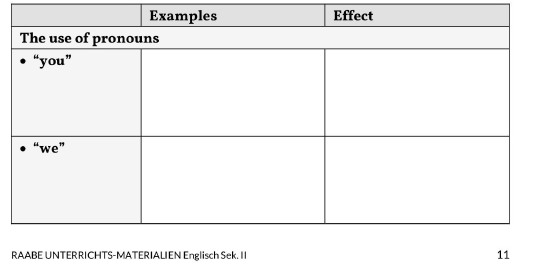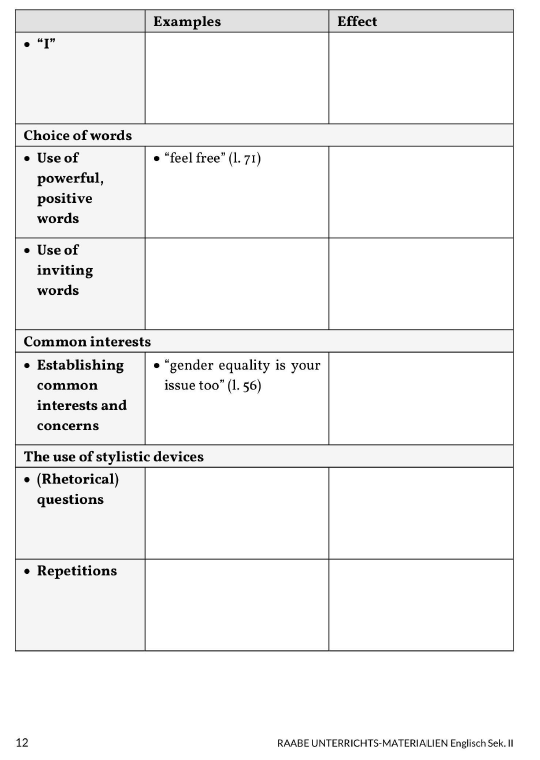Emma Watson on gender (in)equality
Today we are launching a campaign called “HeForShe.” I am reaching out to you because we need your help. We want to end gender inequality – and to do this we need everyone involved.
This is the first campaign of its kind at the UN: we want to try and galvanize as many men and boys as possible to be advocates for change. And we don’t just want to talk about it, we want to try and make sure that it is tangible.
I was appointed as Goodwill ambassador for UN women six months ago and the more I have spoken about feminism the more I have realized that fighting for women’s rights has too often become synonymous with man-hating. If there is one thing I know for certain, it is that this has to stop.
For the record, feminism by definition is: “The belief that men and women should have equal rights and opportunities. It is the theory of the political,
economic and social equality of the sexes.”
I started questioning gender-based assumptions a long time ago. When I was eight I was confused at being called “bossy,” because I wanted to direct the plays that we would put on for our parents – but the boys were not.
When at 14 I started being sexualized by certain elements of the press.
When at 15 my girlfriends started dropping out of their beloved sports
teams because they didn’t want to appear “muscly.” When at 18 my male
friends were unable to express their feelings. I decided that I was a feminist and this seemed uncomplicated to me. But my recent research has shown me that feminism has become an unpopular word. Women are choosing not to identify as feminists. Apparently I am among the ranks of women whose expressions are seen as too strong, too aggressive, isolating and anti-men, unattractive even.
Why has the word become such an uncomfortable one? I am from Britain and I think it is right that I am paid the same as my male counterparts. I think it is right that I should be able to make decisions about my own body. I think it is right that women be involved on my behalf in the policies and the decisions that will affect my life. I think it is right that socially I am afforded the same respect as men. But sadly I can say that there is no one country in the world where all
women can expect to receive these rights. No country in the world can yet say that they have achieved gender equality. These rights I consider to be human rights but I am one of the lucky ones. My life is a sheer privilege because my
parents didn’t love me less because I was born a daughter. My school did not
limit me because I was a girl.
of its kind: von dieser Art, to galvanize: jmd./etw. in Schwung bringen, advocate: Verfechter/Befürworter, tangible: greifbar/fassbar, to appoint sb.:jmd. zu etwas ernennenn,
counterpart: Gegenüber, sheer: bloß/pur
https://www.tutory.de/entdecken/dokument/watson_speech
My mentors didn’t assume that I would go less far because I might give birth to a child one day. These influencers were the gender equality ambassadors that made me who I am today. They may not know it, but they are the inadvertent
feminists who are changing the world today. We need more of those.
These influencers were the gender equality ambassadors that made me who I am today. They may not know it, but they are the inadvertent feminists who are changing the world today. We need more of those.
And if you still hate the word – it is not the word that is important, it’s the idea and the ambition behind it. Because not all women have received the same rights that I have. In fact, statistically, very few have been.
In 1997, Hilary Clinton made a famous speech in Beijing about women’s rights. Sadly many of the things she wanted to change are still true today. But what stood out for me the most was that less than 30 per cent of the audience were male. How can we affect change in the world when only half of it is invited or feel welcome to participate in the conversation?
Men – I would like to take this opportunity to extend your formal invitation. Gender equality is your issue too. Because to date, I’ve seen my father’s role as a parent being valued less by society despite my needing his presence as a child as much as my mother’s. I’ve seen young men suffering from mental illness unable to ask for help for fear it would make them less of a man or less of a man – in fact in the UK suicide is the biggest killer of men between 20 to 49; eclipsing road accidents, cancer and coronary heart disease. I’ve seen men made fragile and insecure by a distorted sense of what constitutes male success. Men don’t have the benefits of equality either. We don’t often talk about men being imprisoned by gender stereotypes but I can see that they are and that when they are free, things will change for women as a natural consequence. If men don’t have to be aggressive in order to be accepted, women won’t feel compelled to be submissive. If men don’t have to control, women won’t have a to be controlled. Both men and women should feel free to be sensitive. Both men and women should feel free to be strong… It is time that we all perceive gender on a spectrum instead of two sets of opposing ideals. If we stop defining each other by what we are not and start defining ourselves by who we are – we can all be freer and this is what
HeForShe is about. It’s about freedom.
inadvertent: unfreiwilligversehentlich, right: Recht, Beijing. Peking, valued: geschätzt, imprison: verhaftet, compelled: gezwungen/ verpflichtet
https://www.tutory.de/entdecken/dokument/watson_speech
I want men to take up this mantle. So that their daughters, sisters and
mothers can be free from prejudice but also so that their sons have permission to be vulnerable and human too – reclaim those parts of themselves they abandoned and in doing so be a more true and complete version of themselves.
You might be thinking who is this Harry Potter girl? And what is she doing
speaking at the UN and it’s a really good question, I have been asking myself
the same thing. All I know is that I care about this problem. And I want to make it better. And having seen what I’ve seen – and given the chance – I feel it is my
responsibility to say something. Statesman Edmund Burke said: “All that is
needed for the forces of evil to triumph is for good men and women to do
nothing.” In my nervousness for this speech and in my moments of doubt I’ve told myself firmly – if not me, who, if not now, when. If you have similar doubts
when opportunities are presented to you I hope that those words will be helpful. Because the reality is that if we do nothing it will take 75 years, or for me to be nearly a hundred before women can expect to be paid the same as men for the same work. 15.5 million girls will be married in the next 16 years as children. And at current rates it won’t be until 2086 before all rural African girls can have a secondary education. If you believe in equality, you might be one of those inadvertent feminists that I spoke of earlier. And for this I applaud you. We are struggling for a uniting word but the good news is that we have a uniting movement. It is called HeForShe. I am inviting you to step forward, to be seen. And to ask yourself if not me, who? If not now, when? Thank you very, very much.
Source: https://www.youtube.com/watch?v=Q0Dg226G2Z8,
http://www.unwomen.org/en/news/stories/2014/9/emma-watson-gender-equality-is-your-issue-too
reclaim: zurückfordern
https://www.tutory.de/entdecken/dokument/watson_speech

https://www.tutory.de/entdecken/dokument/watson_speech

https://www.tutory.de/entdecken/dokument/watson_speech


